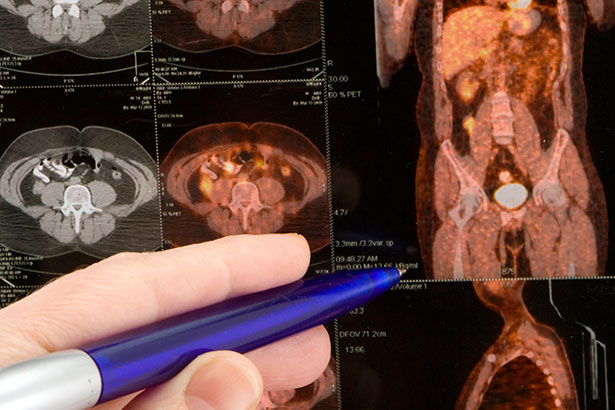
New imaging test allows for earlier and more accurate detection and localization of cancer recurrence in men who have been treated for prostate cancer
May 31, 2017 – Englewood Hospital and Medical Center now offers an advance in the detection of prostate cancer recurrence for men who have undergone treatment such as prostate cancer surgery or radiation therapy.
A C-11 choline PET scan is a highly sensitive imaging test that can indicate prostate cancer cells and their specific location earlier than previous, more conventional tests. During the exam, the patient is given choline C-11 (a radioactive isotope) intravenously in the arm and then undergoes a PET/CT scan. Choline is absorbed by prostate cancer cells and indicates the precise location of the cancer recurrence, for example if the cancer has recurred in the pelvis or spread to the bones.
With more information, physicians can decide what the optimal treatment protocol might be for an individual patient. For example, if the study indicates a local recurrence in the prostatic bed, the patient might be able to be treated locally with salvage radiation therapy. If the study indicates a distant spread of the disease (such as bone metastases), the patient might need a different therapeutic approach requiring a more systemic treatment.
For men who have had primary treatment for prostate cancer, but are continuing to show rising prostate-specific antigen (PSA) levels in blood tests (after prostatectomy or radiation therapy PSA levels should be zero or near zero), a choline PET scan can detect potential sites of cancer recurrence or spread, while levels of PSA are still low. Traditionally, urologists would have to use indirect measures to determine whether a patient had local or systemic disease. Furthermore, C-11 choline PET can pick up cancer recurrence at earlier stages than more traditional imaging studies such as CT, MRI, or bone scans, which only visualize cancer when PSA level volumes are higher in later stages of the disease.
“This is an advance in the detection of recurrent prostate cancer that allows for more effective treatment,” says Dr. Kavitha Vadde, director of nuclear medicine at Englewood Hospital and Medical Center. “We now offer technology whereby we can give the urologist more specific information earlier and can give the patient a chance for a better outcome.”
Choline C-11 is an FDA-approved marker used with PET/CT. The test is covered by Medicare and requires a low level of radiation exposure for the patient.
According to the National Cancer Institute, more than 180,000 new prostate cancer cases and more than 26,000 deaths were estimated in 2016. Between 13 and 25 percent of patients will experience a recurrence, despite having had surgery or radiation therapy.
New imaging test allows for earlier and more accurate detection and localization of cancer recurrence in men who have been treated for prostate cancer
